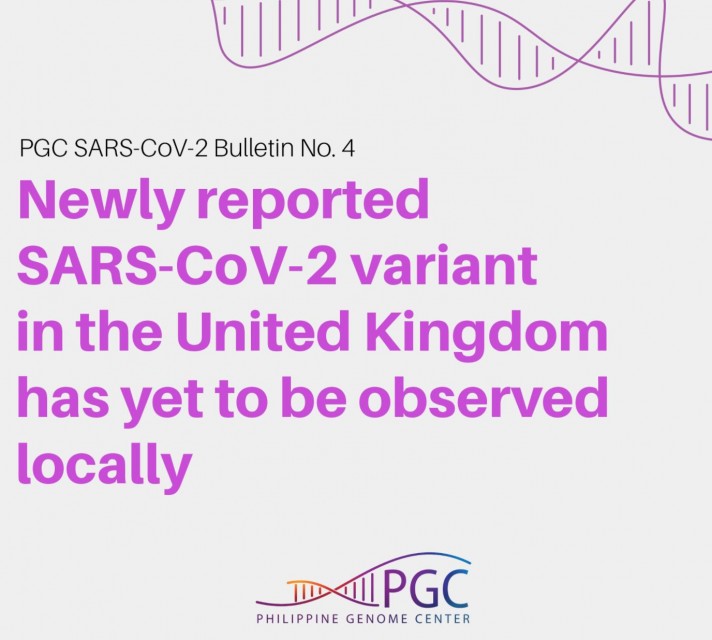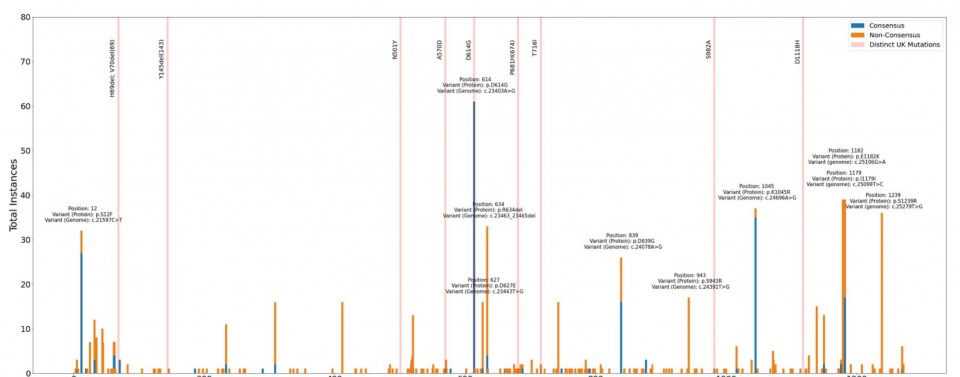But UK variant not yet observed in present COVID virus samples in PHL, says PGC

(Eagle News) – Philippine scientists are monitoring and checking if the reported virus strain in the United Kingdom, variant B.1.1.7, — said to be more infectious than previous COVID-19 mutations — has already reached the country.
The scientists at the Philippine Genome Center (PGC) are tracing if the current variants of the COVID-19 virus include that of the UK virus mutation.
So far, the only strain detected was the D614G variant, which was the earlier variant detected in October which is also highly infectious. It was also the predominant COVID variant in the past in Europe.
But the new UK virus strain, variant B.1.1.7, has not yet been found in the country, based on the last analysis of the local genome scientists.
-Earlier detected infectious COVID strain D614G still dominant in PHL-
Dr. Jaime Montoya, Executive Director of the Philippine Council of Health Research and Development of the Department of Science and Technology (DOST) said that Philippine genome scientists are already doing random analysis of COVID strains in virus positive cases.
“Ginagawan po natin ng randomization iyong mga nakukuhang mga positive result sa iba’t ibang bahagi ng Kamaynilaan. At … nadi-detect iyong unang variant na lumabas sa Europa iyong D614G,” Dr, Montoya said in a press briefing Thursday.
“So, puwede din po nating ma-detect din iyan, dahil may surveillance po tayong ginagawa randomly sa mga nagpa-positive para tingnan iyong virus, iyong composition niya. So, iyon po ang ating gagawin,” he said referring to the new UK COVID virus variant, B.1.1.7.
The PGC also said that that it is currently checking what the virus strains in the Philippines to see if the UK variant can be found here.
“The United Kingdom health ministry has reported a new SARS-CoV-2 variant characterized by multiple mutations in the spike protein region of the virus,” the PCG said in its latest bulletin issued on Dec. 22.
The PGC cited a report posted at the Global Initiative for Sharing All Influenza Data (GISAID) website that described the UK variant.
It said the UK variant of the COVID-19 virus is “said to harbor multiple spike protein mutations within a single sample, including a combination of the following: H69del, V70del(69), Y145del(143), N501Y, A570D, D614G, P681H(674), T716I, S982A, and D1118H (GISAID, 2020).”
“While the discovery of this new UK variant appears to be concerning, the report cautions that the detailed effects of these mutations remain to be fully determined,” the PCG statement said in its SARS-CoV-2 bulletin no. 4.
“In response to this report, we analyzed Philippine SARS-CoV-2 samples with publicly available genome sequences from the GISAID and NCBI GenBank databases, as well as from internal samples recently collected in Metro Manila as part of the Philippine Genome Center’s bio-surveillance efforts,” it said.
-65 COVID virus isolate sequences detected-
The PCG said that it has detected a total of “65 Philippine SARS-CoV-2 isolate sequences” gathered from publicly available sequence databases (GISAID and NCBI GenBank), as well as from in-house samples recently collected in Metro Manila as part of the Philippine Genome Center’s biosurveillance efforts.
After analyzing these sequences of the COVID virus in the Philippines, the PGC said “practically no overlaps were observed between the spike protein mutations of the UK variant and the local SARS-CoV-2 isolates apart from the previously reported D614G mutation.”
“The ten most abundant local spike protein mutations are also labeled, with D614G still appearing to be the most frequently observed,” it noted.
The PGC then said that the local COVID virus sequences in the country appeared not to be related so far with the new COVID variant in the UK.

“Based on the results of our latest analysis, we found practically no overlapping spike protein mutations between the described UK variant and the local samples apart from the previously reported D614G mutation – suggesting that the local isolates are not closely related with the UK variant,” it explained.
There was a different set of spike protein mutations identified locally, the PGC said, and majority of these were these “variant positions have already been seen in samples from other countries.”
But the PGC said that it would continue to monitor and analyze SARS-CoV-2 isolates to “inform and guide our relevant government agencies and the general public regarding significant changes in both locally and globally circulating viral populations.”
In September this year, researchers at the University of Hong Kong had a study that showed that a significant variant characterized by the earlier D614G mutation had higher infectivity. This reportedly accounted for its rapid rise becoming the dominant virus variant in regions where this had emerged.
The Philippine Genome Center found that D614G variant in COVID virus samples taken in the Philippines in June and July this year, and were found to be “more closely related to European isolates.”
(Eagle News Service)








